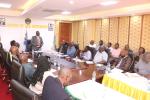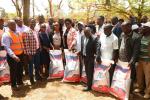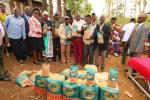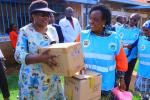Infrastructure & Access
The county infrastructure comprises of road network, airstrips, electricity, telecommunication, financial institutions, education facilities, health facilities, markets and housing.
Road Network, Airports and Airstrips

Posts and Telecommunications: Post Offices, Mobile telephony, and Fixed Lines
There are six post offices and four sub-post offices with numerous registered stamp vendors in the county. The six post offices are in Meru, Maua, Nkubu, Timau, Muthara and Laare towns which offer mail services and parcel delivery among other services. Most private and public organisations have embraced ICT in the day to day operations. Private entrepreneurs have continued to set up cyber cafes in major towns and trading centres due to high demand for internet services among others. Most of the areas in the county are covered by mobile phone network with the coverage being 95per cent. Areas without mobile network coverage are mainly areas of Tigania bordering Isiolo. Most of the community members rely on radio, Television and Newspapers as the major sources of information.
Financial Institutions: Banks, SACCOs and Micro Finance Institutions
The county has high agricultural potential which has attracted various commercial banks and other financial institutions. There are sixteen commercial banks, eight microfinance institutions, four village banks and a number of SACCOs. The strong presence of the various financial institutions indicates that the county has high potential for commercial services. The major commercial banks include Kenya Commercial Bank, National Bank of Kenya, Barclays Bank, Equity Bank, Cooperative Bank and Standard Chartered Bank. The various micro-finance institutions provide credit facilities to the small-scale enterprises. These include Small and Medium Enterprises Program (SMEP), Kenya Women Finance Trust (KWFT), Faulu Kenya among others. The Central Bank of Kenya has a currency centre in Meru town which acts as a banker to the commercial banks operating in the county.
Major insurance firms operating in the county includes APA Insurance, UAP Insurance, CIC Insurance among others. There are several SACCOs whose membership range from farmers to salaried employees such YETU Sacco, Meru farmers Sacco, Meru Teachers Sacco among other which offer credit to its members.
Education Institutions: Primary/Secondary Schools, Polytechnics, Colleges, Universities
There are 792 Early Childhood Development Centres (ECD), 647 primary schools and 192 secondary schools. The county has 15 education divisions and zones. The introduction of Constituency Development Fund has enabled the construction of various mixed day secondary schools. The University of Nairobi, Jomo Kenyatta University of Science and Technology, and Chuka University are the public universities with campuses within the county. Kenya Methodist University is the only fully pledged private university in the county. Other private universities such as Mount Kenya University and Nazarene University have campuses in the County. In addition there are two teacher training colleges namely Meru and Igoji Teachers Training Colleges. There are five technical institutes and various private colleges most of them offering training in ICT.
Figure 4: Antuanduru Primary School in Tigania East
Energy Access (Main sources of energy, Electricity coverage etc)
The main source of energy for cooking by household is wood fuel and charcoal which accounts for 86.1 per cent and 6.6 per cent respectively. The number of household connected to electricity is 13.6 per cent; those using paraffin are 4.5 per cent, gas 2.4 per cent, biogas 0.1 per cent and solar 6.6 per cent. Major public and private institutions are connected to national grid but the major challenge for the county is how to connect the over 85 per cent households with electricity.
Markets and Urban Centres
There are five main urban centres and forty nine trading centres in the county. Meru Town, Nkubu, Laare, Timau and Maua are the major urban centres. Meru town is the largest in the county. All the trading centres are agricultural markets with all centres having two market days per week.





